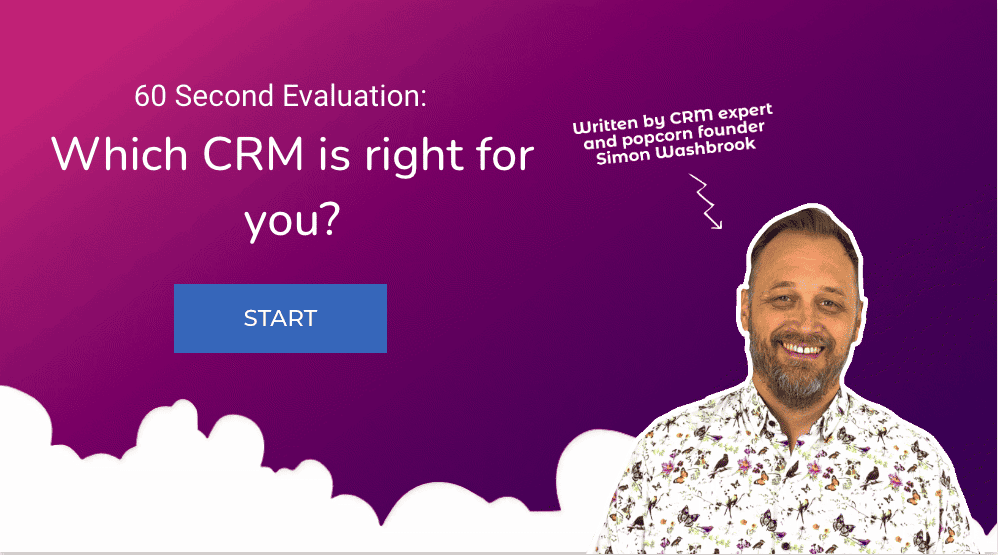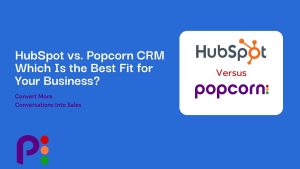When does my small business need a CRM?
‘When does my small business need a CRM?’ … This is one of the most common questions I get asked by small-business owners, and yes, I could go into explaining all the benefits that a CRM will bring to your business, but you have probably already seen loads of articles covering this.
Instead, I thought it best to look at the journey a typical small business owner goes through, as this is the best way to answer the question ‘When does my small business need a CRM?’, as it will flag up what is happening in your business right now.

How to tell when your Small Business needs a CRM
When you set up your business, you probably started out with a very small number of customers, or none at all and you were probably managing everything to do with them in your head. But when that became a bit too much or if you were just super organised, you put together a spreadsheet. And this works brilliantly, as you can now see everything in one place.
But as your customers and prospects grow, your spreadsheet starts to get a bit more complicated – you add different tabs, colour code lines and are proud of yourself when you start adding filters and formulas (I remember looking at my first prospecting spreadsheet and thinking how great it was). And if you’ve got to this stage, you’ve probably already imported that spreadsheet into a email service like MailChimp, so you can start Marketing to your customers/prospects. You’ve added them into Trello, to manage the process and perhaps you’ve even given a Virtual Assistant or Marketing Agency access / made a copy for them to use.
Your business is now growing nicely and so you start to do more Marketing activities, more people get involved and you inevitably start generating more and more leads / opportunities, some of which may not need following up for several months.
This is the point that most established small business owners look back and say that their small business needed a CRM.
But they didn’t implement it, as they were so focused on growing their business, they thought they didn’t have the time and they also hoped they could make their existing system work for a bit longer. Hindsight is a wonderful thing, as most business owners said that when they waited too long, they lost control of their prospecting process. Their prospecting data and communication history was all over the place, different members of the team couldn’t see what each other were doing, what their conversations had been, and they were not able to see the bigger picture to target the right people with relevant Marketing.
Put simply, they did not have the controls in place to see where every single prospect was in their sales process, which meant that they were now losing sales and missing opportunities.
So what should I do, now that I know my small business needs a CRM?
If you’ve been nodding along to everything I’ve just said, you’re probably now thinking … if we are going to make the jump, we should do it properly, and implement a system that will be right for the next 5-10 years. Well, this is the next moment that many established small business owners look back on and wish they had done differently. The reason for this is that they jumped and invested in one of the big CRM companies such as HubSpot, Zoho CRM or Sugar CRM – but these systems are designed for Large Businesses and having all of the bells and whistles can result in confusion and overload – 80% of businesses stop using CRM altogether at this point and go back to their Spreadsheets. But that doesn’t really solve the problem.
So, what should I do this time?
Your decision making process should primarily be based upon what your business needs are now, find a CRM system which will help you to get to year 5. At that point you will know what your business looks like and be able to make a better and more informed decision about which system you need moving forwards.
There are loads of CRM systems out there, all with different focuses (Sales, Contact Storage, Prospecting, Marketing, etc…) – Our best advice is to start off with one that is simple, designed for a small business and focuses on what your business needs are now. If you do this, you and your team will love using it because it’s easy to use and everyone will see the benefits it brings to your company. And then in a few years, you can review what you are doing and if your business needs have changed, you can always migrate to a new more advanced CRM, like HubSpot Zoho CRM or Salesforce – with all the bells and whistles and increased costs that this brings.
To put it another way, if you were a Milkman selling bottles of milk door to door, you wouldn’t go and buy yourself a HUGE articulated lorry, because in 5 years time your business plan had in it to buy a farm and then you would need it to deliver 1000’s of bottles to a national chain of supermarkets – you’d get yourself a transit van (other makes of van are obviously available), so you could get around all the narrow streets and deliver your milk easily. And then in 5 years time when you have bought a farm, you can they buy your huge artic!

The future – joining up CRM, Operations and Accounting.
Ok, so let’s imagine it’s a few years later, your business has grown – you’ll be asking yourself the sensible questions, ‘How can I make my CRM work better?’.
At this point you are probably running 3 main types of software in your small business, that manage 3 very different process types:
– CRM / Marketing – Prospect data into customers
– Operations – Delivery of your product / service
– Finance – Quotes and payments
The usual thought process is to join up the these, whish as first thought sounds very logical, although,most established small businesses owners that have been through this process, said to us that again, they started looking for an advanced CRM that had all the bells and whistles would do everything, they all said that they wanted it to automate all their processes, by joining up CRM, Accounting and operations in one place to save them time, whilst simplify the running of their business.
But when they went down this route, they experienced a similar problem: the specialist software they were currently using, did the job brilliantly, but when they tried to bring it all together under a single CRM platform, they lost many of the benefits that the individual pieces of software had and needed to pay for customisation to make to do what the individual softwares did. All of this is very time consuming, becomes clunky to use and is very expensive.
So, whilst systems like HubSpot can do amazing things, please bear in mind that they are actually designed for Large organisations, who have the resources to cover the costs (ongoing / hidden fees, and customisation) and the staff to run them. Where-as by working smarter, you can utilise tools like Zapier to integrate the software you are already using and achieve the same results.
Summary
Hopefully, I have been able to answer your question of ‘When does my small business need a CRM?’, but to summarise the article I’d say that:
Whilst a spreadsheet may work for most Small Businesses at the start, understanding the problems that come about from not having a CRM in your small business, will allow you to spot issues before they begin to impact on your business growth.
Then, in short whenever you’re reviewing your which CRM is right for your Small business, always think about what your business needs and keep it as simple as possible, because the more bells and whistles you bring in, the more complex it becomes and the harder it is to use. And as you know running a small business is hard enough, so keep it simple
popcorn is a simple to use CRM that is design specifically for small businesses. This has just essential marketing tools needed to help you manage, nurture, and convert your prospects, faster. find out more












